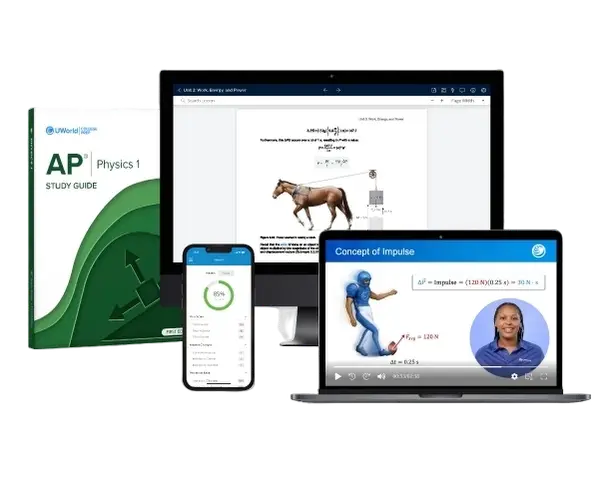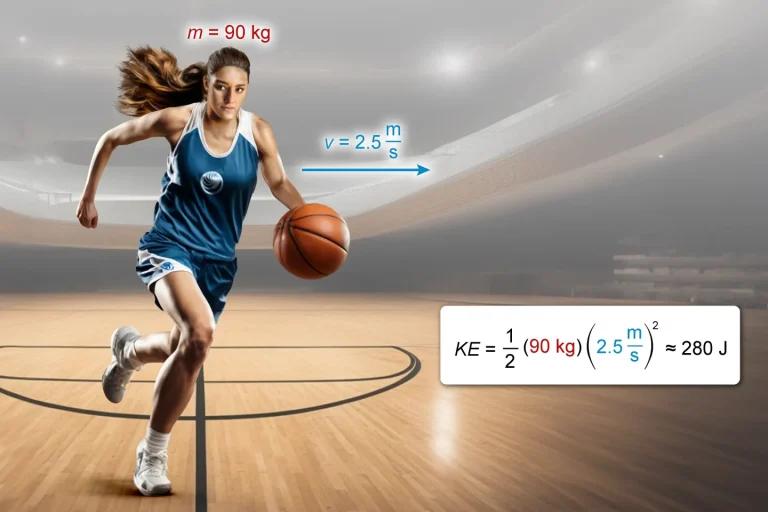AP Physics 1 is equivalent to the standard algebra-based physics course typically offered in the first semester of college for students majoring in biology or life sciences. The high school course covers the same 1-semester college syllabus over 2 semesters.
This course1 provides a strong conceptual foundation on Newton’s laws, conservation principles, and rotational and oscillatory motion. Achieving a score of 3 or higher on the AP Physics 1 exam may make you eligible to receive credits and skip this course in your first semester of college.
AP Physics 1 requires successful completion of high school geometry and concurrent or prior enrollment in Algebra 2 or an equivalent course. Some schools may require Algebra 2 or Pre-calculus as a prerequisite. While trigonometry is needed for specific questions, these topics are typically covered in the course or a concurrent math course. The course focuses on developing mathematical reasoning and critical thinking, often through real-life physical applications, making it one of the more practical AP courses.
In addition to standard classroom lectures, you will engage in lab work, which constitutes 25% of the instructional time. This hands-on experience is essential for understanding fundamental concepts through observation, data collection, and analysis.
What Is on the AP Physics 1 Exam?
The AP Physics 1 exam will test your knowledge of the course material in each unit and the related science practices in the course. It covers topics such as Newtonian mechanics, momentum, energy, rotational motion, and more. The course is divided into 8 units, each contributing a specific percentage to the exam. Here's an overview of the units and their exam weight:
| Instruction Units1 | Exam Weight |
|---|---|
| 1. Kinematics | 10-15% |
| 2. Force and Translational Dynamics | 18-23% |
| 3. Work, Energy, and Power | 18-23% |
| 4. Linear Momentum | 10-15% |
| 5. Torque and Rotational Dynamics | 10-15% |
| 6. Energy and Momentum of Rotating Systems | 5-8% |
| 7. Oscillations | 5-8% |
| 8. Fluids | 10-15% |
Questions on the AP Physics 1 exam will be framed so that you will be required to use 1 or more science practices to get the correct answer. There are 3 science practices that you will be tested on:
- Science Practice 1: Creating Representations
- Science Practice 2: Mathematical Routines
- Science Practice 3: Scientific Questioning and Argumentation
AP Physics 1 Exam Format
AP Physics 1 has 2 main sections. Section 1 consists of multiple-choice questions (MCQs), and Section 2 has free-response questions (FRQs). Each section accounts for 50% of the total weight you can score on the exam. During the 3-hour exam, you will answer 40 multiple-choice questions and 4 free-response questions.
| Question Type2 | Score Weight | No. of Questions | Time |
|---|---|---|---|
| Section 1: Multiple-choice questions (MCQs) |
50% | 40 | 1 hour 20 minutes |
| Section 2: Free-response questions (FRQs) |
50% | 4 | 1 hour 40 minutes |
Get more details about the AP Physics 1 exam format in our article — AP Physics 1 Exam Format.
Why Should You Take AP Physics 1?
AP Physics 1 is the most straightforward of the 4 AP Physics courses. With its limited prerequisites and foundational-level course material, AP Physics 1 can be a stepping stone for higher-level classes, so more students enroll.
Here are 6 reasons why you should take AP Physics 1:
- Free College Credit: If you get a final score of 3 or higher, you could be eligible for free college credit in your first semester. Every college has minimum score requirements to receive credit, so check with each before you apply.
- Reduced Tuition: One of the greatest benefits of receiving college credit is the overall reduction in tuition fees. Given how expensive a college education can be, any financial relief is a plus.
- Strong Foundation for AP Physics 2 and AP Physics C: Taking AP Physics 1 can provide you with a solid foundation for taking additional AP Physics courses, including AP Physics 2 and AP Physics C: Mechanics. In fact, AP Physics 1 is a prerequisite for taking AP Physics 2. Much of the material covered in AP Physics 1 is also covered in AP Physics C: Mechanics.
- Ideal College Prep: Successfully completing the course will give you a solid foundation in college physics. Plus, it will also help prepare you for the pace and intensity of college courses in general.
- Vital Development Skills: Studying physics helps you build certain scientific skills. The ability to conduct experiments, make predictions, and draw comparisons and conclusions from data through critical thinking is crucial for the AP Physics 1 exam. The AP Physics 1 course is specifically designed to help you develop these skills.
- Future Career Steps: Taking AP Physics 1 can expose you to the core of physics and its study. It will also help you decide whether a career in the field of physics is something you'll excel at and enjoy.

Should You Take AP Physics 1?
The aptitude to study physics at a higher level will vary for each student. Here are a few self-evaluation questions to help you figure out if you should take AP Physics:
-
How interested are you in physics?
AP Physics 1 explores how the world works, covering essential concepts including motion, forces, energy, waves, and electricity. You'll dive into questions such as why objects move the way they do, how energy transfers, and how waves interact — all through hands-on experiments and problem-solving. Being curious about these topics can make mastering the course much easier and enjoyable.
-
Do you intend to study physics in the future?
AP Physics 1 is specially designed for students who plan to study the biological/health sciences at a higher level. So, if that's in the cards for your future academic plans, taking AP Physics 1 can be a smart choice.
-
Have you completed geometry, and are you taking Algebra 2?
AP Physics 1 requires a strong foundation in geometry for problem-solving and Algebra 2 skills for handling algebra-based equations. If you're comfortable with both, you'll be well-prepared!
-
Have you talked with your peers and your guidance counselor?
By talking to students who have already taken the AP Physics 1 exam, you can better understand whether you're ready for it. Your guidance counselor will also be able to consider your past class performances, current and past schedules, and future college/career goals while advising you on whether AP Physics 1 is the course for you.
Is AP Physics 1 Hard?
AP Physics 1 is often seen as more approachable than AP Physics 2 or AP Physics C: Mechanics, but it actually has the lowest pass rate. Here are a few factors to think about as you approach this class:
- Class Schedule: AP Physics 1 requires solid study time, so if your schedule is packed, keep your workload in mind for managing homework and test prep.
- Math Skills: Since a strong foundation in algebra and geometry is essential for this course, building confidence in these skills through concept review can make AP Physics 1 much more manageable.
- Drawing and Visualization Skills: You'll need basic drawing and visualization skills to understand and create diagrams in this course. You don't have to be an artist, but if sketching diagrams sounds daunting, take some time to practice — it'll make a big difference!
- Quality Resources: UWorld's all-in-one AP Physics 1 prep course can fill the knowledge gap on challenging topics and prepare you for the exam.
What's the Difference Between AP Physics 1, 2, and C?
In addition to AP Physics 1, the College Board offers AP Physics 2, AP Physics C: Mechanics, and AP Physics C: Electricity & Magnetism. Understanding the difference between them can help you decide which one to take.
| AP Physics 1 | AP Physics 2 | AP Physics C |
|---|---|---|
| Equivalent to a first-semester college course | Equivalent to a second-semester college course | Equivalent to a first-semester or second-semester college course |
| Algebra-based physics | Algebra-based physics | Calculus-based physics |
| No prior knowledge of physics is required | Successful completion of AP Physics 1 or an equivalent course is required | Successful completion of Honors Physics or an equivalent course is recommended |
| Studying Algebra 2 or an equivalent course is required | Studying precalculus is required | Studying calculus is required |
| Commonly taken in year 1 | Commonly taken in year 2 after completing AP Physics 1 | Commonly taken in year 1 or year 2 (or simultaneously) |
| Requires 25% laboratory work | Requires 25% laboratory work | Requires 25% laboratory work |
AP Physics 1 Exam Review Tips
Here are some tips to help you review for the AP Physics 1 exam. Our AP Physics 1 study guide offers an even more in-depth look at how to prepare for the exam.
-
Make a schedule
Having a well-planned schedule throughout the school year is the best way to keep track of the topics you've covered and those you have yet to work on.
-
Get familiar with the format of the exam
Knowing the exam format will help you know what to expect on the exam.
-
Practice tests
Invest in practice material by opting for UWorld's AP Physics 1 question bank that cover 400+ exam-level questions and 150+ check-for-understanding questions.

Frequently Asked Questions (FAQs)
Where can I find past AP Physics 1 exam questions?
The College Board website will have questions from past AP Physics 1 exams.
What happens if I fail the AP Physics 1 exam?
You can retake the AP Physics 1 exam any year in high school, but it’s only offered once a year. If AP Physics 2 interests you, check in with your guidance counselor to see if it is the best option for you. And remember, even students scoring below a 3 often perform better in college than those who haven’t taken AP courses!
When do students usually take AP Physics 1?
Students usually take AP Physics 1 in their third year of high school, followed by AP Physics 2 in their fourth year.
How much does it cost to take the AP Physics 1 exam?
It costs $99 USD3 if you are a student within the U.S. or $129 USD if you are an international student. To learn more about these costs and any possibility of deductions, read our article on AP Exam Eligibility & Registration.
Can a high school junior take AP Chemistry and AP Physics 1 in the same year?
That depends on your aptitude for these subjects and your high school schedule. Check out our AP Chemistry Exam guide and AP Chemistry Course and Exam Description for more details.
References
- AP Physics 1. (n.d.). apcentral.collegeboard.org. Retrieved from https://apcentral.collegeboard.org/courses/ap-physics-1
- AP Physics 1: Algebra-Based Course and Exam Description. (Fall 2024). apcentral.collegeboard.org. Retrieved from https://apcentral.collegeboard.org/media/pdf/ap-physics-1-course-and-exam-description-effective-fall-2024.pdf
- AP Exam Fees. (n.d.). apcentral.collegeboard.org. Retrieved from https://apcentral.collegeboard.org/exam-administration-ordering-scores/ordering-fees/exam-fees
Read More About the AP Physics 1 Exam
Master the AP Physics 1 exam format with insights into question types, topic weights, and key details to help you prepare confidently for the exam.
AP Physics 1 Exam ScoringLearn AP Physics 1 scoring with rubrics, score distributions, how to estimate your score and the minimum score requirement for your dream college.
AP Physics 1 Exam Study PlanDiscover the ultimate AP Physics 1 study plan! Packed with expert tips, strategies, and trusted materials to help you prepare and ace your exam.
AP Physics 1 Course and Exam DescriptionExplore AP Physics 1's 8 units and science practices in the updated Course and Exam Description (CED) for a clear guide to excel in your exam prep.
Best AP Physics 1 Study Guide ComparisonDiscover expert insights into Kaplan, Barron's, Princeton Review, and UWorld. Learn how each resource compares to help you choose the best fit.
Best AP Physics 1 Review Course ComparisonSearching for top AP Physics 1 prep courses? Read this review to compare the best courses and choose the perfect one for your success.




